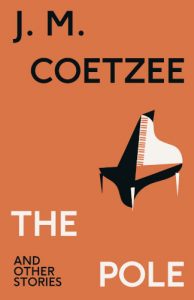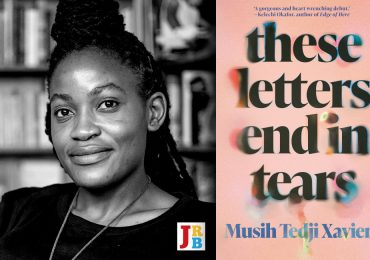JM Coetzee’s late style has often been indifferently received, but The Pole is a beautifully elegant story, writes Wamuwi Mbao, in a review that might count as being ‘in conversation’ with its contemporaries.

The Pole and Other Stories
JM Coetzee
Penguin Random House SA, 2023
At a time when much new literature seems tangled in a kind of indirection, there is something crisply pleasing about encountering anew the high-beam minimalism that marks JM Coetzee’s writing. His work exhibits a stronger degree of literary intelligence than is now common, and a new Coetzee descends upon the scene with all the necessary reverence. His latest, The Pole, arrives some time after its initial publication in Spanish (by the Argentine imprint El Hilo de Ariadna, in 2022) like a work of translation.
This is Coetzee-to-go, a bracing 150-page ‘thinking’ novella, to which have been appended five previously seen stories. There are overlapping concerns in each of these stories—none of them especially world-shaking on the surface—and each shares the same high-toned ethical sod-turning that either delights or appalls you, depending on your taste.
The Pole is a brisk story about—perhaps it is a vandalism to summarise it—a painfully awkward encounter between Beatriz and Witold, the eponymous Polish concert pianist. Beatriz is in her forties, a stern Catalan socialite, saddled unwillingly with the task of chaperoning Witold around Barcelona, where he has been invited to perform. Witold is, by most measures, a cold fish. He looks like Max von Sydow, but he lacks charisma. He plays competently, but without brio. His recital disappoints Beatriz, who expects:
To be transported, to be lost in transports: an outdated idea, in all likelihood, of what music does for its listeners—outdated and probably sentimental too. But that is what she desires on this particular evening, and that is what the Pole does not provide. The applause, after the last of the Preludes, is polite but not enthusiastic. She is not the only one who came to hear Chopin played by a real Pole, and has been disappointed.
At dinner afterwards, when all that is demanded of him is that he play the maestro before his obliging audience, Witold is underwhelming, almost taciturn. The evening is stilted; it drags along painfully. They part, and Beatriz is glad to be shot of him. But of course, that isn’t the last of it. Witold begins a series of creaking advances, first inviting her to come and meet with him in the city where he is teaching (she does, eventually), and then inviting her to Brazil. Beatriz rebuffs Witold’s feeble yet intrusive advances, as ‘too dry, too lacking in ardour’. Yet he persists, and she becomes increasingly frustrated with his declarations of devotion:
You barely know me, so let me tell you who I am. First and last, I am a married woman. Not a free spirit but a woman with a husband and children and a home and friends and commitments of all kinds, emotional commitments, social commitments, practical commitments. There is no room in my life for—what shall I call it?—an affair of the heart.
The distance between ‘The Pole’ and Witold himself is yawning, and neither Witold nor Beatriz has the language to bridge the divide between them. The work puts one in mind of Vigdis Hjorth’s a House in Norway, and not just because Hjorth’s 2017 novel also features a drawn-out awkwardness between the protagonist and a tenant she comes to think of as The Pole. It’s because what lies at the heart of Hjorth’s novel is a question about how distant people can be from the ideas we impose on them. Much of The Pole is taken up with Beatriz’s internal conversations about Witold and his inimical meaning to her life.
One of the central questions around which the novel rotates, then—a question that flavours much of Coetzee’s work—is what we do when we are called upon, against our inclinations, to take responsibility for some unpromising and unsuitable other. Remember the young experiencing self in Boyhood recalling his late aunt’s collection of books and wondering, ‘and if he does not remember them, who will?’ That Coetzeean leitmotif is echoed here when Witold leaves Beatriz a series of poems dedicated to her: ‘What to do? Take the poems with her or leave them here, abandon them, forget about them? The man is dead. The daughter doesn’t care. There is no one to answer to but herself.’
Coetzee’s writerly preoccupations in the last two decades have been varying in their range and experimentation, but they all enlist that most terrible of feelings, awkwardness, as their energising impulse. The novels and short fictions that followed from Elizabeth Costello onwards are distinctly playful in the cringeworthy scenes they generate between characters ill-suited to what is being asked of them. There is misunderstanding between two souls who cannot express what they feel most deeply; there is faltering, half-hearted sex that peters out (Coetzee has long exploited his facility for conjuring the ick in his descriptions of sex); there is the frustration of being tasked with something burdensome when all one wants is to be freed of any obligation.
There is also a healthy amount of inner monologue, and an absence of outwardly directed action. In many senses, very little happens in these books, but a great deal of discussion takes place. In this regard, there is something of Elena Ferrante in the exhalation of thought that marks a work like The Pole. While perhaps not as well-drawn a character as Elizabeth Costello, Beatriz’s fierce determination that she will not be co-opted into a man’s fantasy is convincing, as are the little glints that tell us that we may be seeing less of her inner world than appears the case. It isn’t that she’s an unsentimental character: rather, her sentimentality belongs to an inner world that is hers alone.
Getting all of this into a novella without creating a dense pudding requires some skill. But Coetzee is brilliant at swiftly getting a mood, or a feeling, or a moment across without resorting to realist padding. Here, the story is often quite happy to sketch a desultory realism before setting the characters loose on the stage: ‘They go for a walk on a tree-lined path along the riverside. It is a pleasant autumn day. The leaves are turning, et cetera.’ That wink to Nabokov also signals a clear feeling that there are more important things than narrative detail, an impatience with lingering at the site of the sentence that nevertheless produces a beautifully elegant story that quickens pace as it hurries to its critical point.
Coetzee’s late style (it is almost convention to misuse this term with any older male author) has often been indifferently received by a novelty-driven reading public eager for him to deliver a belter with the gravity of his early novels. The later stories, with their great capacity for exploring awkward encounters between unlikely people, or in which unpromising characters are caught up in the various questions an ethically difficult world generates, are gentle but resonant, rather than thumping must-reads. Where other writers make their ethical questions feel like a smoky seven-course banquet (McCarthy), interiority fine-dining (Cusk) or subscription-box fare (whoever has been named as this year’s ‘serious’ novelist), Coetzee’s recent fiction is a menu entirely made up of palate cleansers. And just as a plate full of sorbet would be heavy going, these later books actually work well because they are sparsely arranged and well-proportioned. They do not prolong their stay. Think of the shaved-down stories of Senor C and Anya in Diary of a Bad Year, served with slices of sober noughties-era essayistic pieties, or the unit block world of the Jesus novels. Of course, if you prefer the messy rib-sticking luxury of a more filled-in style, then a story like The Pole is just the sort of thing that appals.
Certainly, the recent stuff has caused dismay and consternation in those nostalgic for the old Coetzee. The lazy way to review a work like The Pole usually involves using ‘meditation’ as a naming noun, followed by a few paragraphs in impressed tones about why this is exactly the sort of book that allows people to feel clever about themselves. Or, more voguishly, one could bat it aside impatiently, refusing to be taken into the confidence of something that seems Casaubonesque and perplexing, in our infantocratic age that has no time for the ramblings of old men. Certainly, The Pole and the posse of short fictions included with it frustrate those who look to call their author ‘magisterial’. The Costello stories—I have an especial fondness for ‘As A Woman Grows Older’ and ‘The Old Woman and The Cats’—are moreish numbers, their affecting sincerity lodging a firmer place than the title story.
There is a sense in which the main feature is an oddly voided work: the Iberian setting leaves no brushstrokes. Compare the work of Coetzee’s finest contemporary, the late Javier Marías, where a lengthy diversion on a character’s barbarously over-familiar use of the second person address tú opens up an entire world of regional texture for the reader. The vibration of translation is present in The Pole, but only as the merest of shimmers between Beatriz and Witold. Witold’s foreignness generates a certain sympathetic awareness in the reader of what cannot be communicated: who except the captively monolingual has never experienced the thwarting inexactitude of language to say what you actually mean? The Pole and Other Stories is as poignant as you’ll get from Coetzee. The caravan works in a realm of gentle feelings, but after the rather inert Jesus novels, it has a lively mix of qualities, and if it never flares into a full fireworks display, it is nonetheless a read that delivers some warmth.
- Editorial Advisory Panel member Wamuwi Mbao is an essayist, cultural critic and academic at Stellenbosch University. Follow him on Twitter/X.






I thoroughly enjoyed reading this review, which in its deft strokes is equal to the material under review. Thank you!